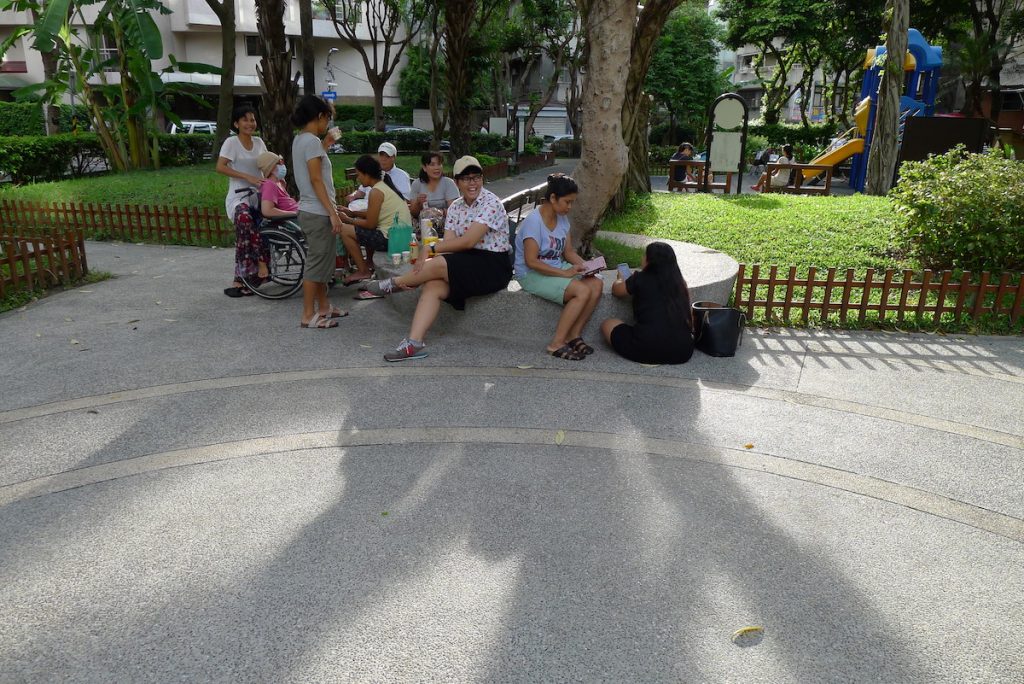Browse

Photo caption: A group of Indonesian migrant workers and carers in Taipei was taking a pause in between the working hours in a park near Zhongxiao Xinsheng MRT station. As seen in the picture, Khairunnisa, a member of Yogyakarta-based Bakudapan Food Study Group (with an off-white cap and grey sneakers), was hanging out with the carers in the park during her residency in Bamboo Curtain Studio, Taiwan, in August 2016. Photo by Gatari Surya Kusuma (Bakudapan Food Study Group).
To live is to push through, try to forget what needs to be forgotten, or patch some things up, and carve the space in between remembering, forgetting, and keep on living. The carved space turns into a site, filled with notes of curiosities, reflection on everything, products of overthinking practices, something new and old, and all broken and profound stuff. Such space grows into a compendium of useful archives about anything something.
My project is dedicated to create different shapes of archives to fill up the space produced from the opportunities to travel and work outside of the familiar zones. The development of the archives will be structured around the everyday time arrangement of the migrant workers who live and work in Taiwan. The structure of the migrant workers’ everyday life is based on the short stories and poems written by migrant workers. The writings are the labor of their intellectual works, produced by their capacities to steal some time to write amidst their works obligation. During residency, I move in and out the migrant workers’ literary works, and let these works to inform how I view Taiwan urban landscapes and learn to master the skills of stretching and loosening the time. To archive is to learn about how to keep it going; it is the act of survival. In this talk, I will present my exploration of how the narration of these literary works intertwined with my observation and personal mode of archiving. (Nuaini Juliastuti)
Nuraini Juliastuti is a co-founder of KUNCI Cultural Studies Center (Yogyakarta, Indonesia). KUNCI is a research collective, which focuses on creative experimentation and speculative inquiry between theory and practice. Her education background includes MSc in Contemporary Asian Studies (University of Amsterdam) and PhD in Cultural Anthropology (Leiden University). Nuraini’s research writings have been published widely in Indonesian media and cultural organisation (Tempo, Kompas, The Jakarta Post, Indonesian Visual Art Archive), international art publications (Art Monthly Australia, Metropolis M, Afterall Journal, Discipline), and artists’ book and monograph (Stedelijk Museum and Sternberg Press), and refereed academic journal (Jurnal Perempuan, Inter-Asia Cultural Studies). In collaboration with KUNCI, she has produced a body of research works, which use publication, exhibition and gathering as modes of presentation and engagement. KUNCI developed Made in Commons project, which was presented in Stedelijk Museum Bureau Amsterdam (in 2013) and Jogja National Museum (in 2015). In 2015, in collaboration with Para/Site and Indonesian migrant workers in Hong Kong, KUNCI developed Afterwork Reading Club, a reading club dedicated to the literature on modes of gendered migration. The reading club is culminated in the publication of Afterwork Readings, an anthology of short stories and poems written by Indonesian, Filipino, and Chinese workers/ migrant workers. In 2017, KUNCI developed Tropical Dissonance: Decolonising Knowledge through Colonial Archives and presented it at the Tropenmuseum. KUNCI is working on a long-term project titled School of Improper Education (2016-2019). Currently Nuraini developed her own project titled Domestic Notes. Domestic Notes is a publication-based project uses domestic and migrant spaces as sites to discuss everyday politics, organisation of makeshift support system, and alternative cultural production.
Wu Ting-Kuen, born in Kaohsiung, Taiwan, Wu graduated from the College of Communication, National Cheng-Chi University. He was once a volunteer for “4-Way News.” In 2014, he was selected for the “Wanderer Program” (funded by the Cloud Gate Foundation), which ignited his interests in the issues of migration, especially those related to Indonesian migrant workers. Since 2015, Wu has been working in “Brilliant Time Southeast Asia Themed Bookstore” and “Taiwan Literature Award for Migrants” (TLAM) as an event organizer; in the same year, he founded “Taman Baca TMS,” the Indonesian mobile library at Taipei Main Station. In 2016, Wu collaborated with an Indonesian writer Sunlie Thomas Alexander in the research of Hakka people’s migration to Bangka Island thanks to the funds of “Be Young and Beyond: Hakka Projects 2016” (by Taipei Hakka Affairs Commission) and “The Emerald Initiative” (by Ministry of Culture), and subsequently published Sunlie’s short story and poetry anthology “Ghost Ship” (Chinese edition) in Taiwan. Lately, in 2017, he cooperated with the National Museum of Taiwan Literature in programming the concert “Those Our Songs – Taiwan Pop Music and Southeast Asia.” By the end of the year, he was commissioned as a consultant of the National Museum of Prehistory’s tour exhibition “Fertility, Blessings, and Protection – Cultures of Baby Carriers” which was held in the National Museum of Indonesia.
NML Residency & Nusantara Archive project (The 1st Year): www.facebook.com/NusantaraArchive/
Organizer: No Man’s Land; Digital Art Foundation
Associate Organizer: ET@T, Open-Contemporary Art Center
Observation Team: Fiona Cheng, Wu Ting-Kuen, Posak Jodian, Alice Ko (supported by National Culture and Arts Foundation)